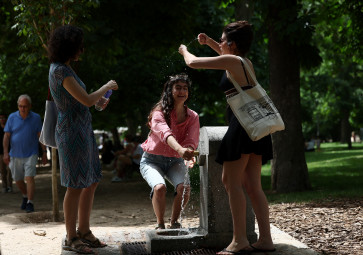Mothers cry over widespread bigotry
Even in death, some subscribers to indigenous faiths remain victims of discrimination
Change text size
Gift Premium Articles
to Anyone

E
ven in death, some subscribers to indigenous faiths remain victims of discrimination.
Dian Jennie Cahyawati, of the native Sapta Dharma religion from East Java, complained that the government failed to protect the rights of her community, even after they passed away.
“A joint decree between the Home Ministry and the Culture and Tourism Ministry in 2009 says that we have the right to burial in public cemeteries. But in reality, we still get rejected when we try to bury our dead brothers and sisters,” Dian said on Thursday.
Dian recalled that in 2009 the Sapta Dharma in Brebes, Central Java, received complaints from local authority for burying one of their members in a public cemetery.
Local officials went as far as threatening them with exhumation.
“In the end, we just decided to cremate the body to avoid unnecessary conflict,” Dian said.
The government officially recognizes only six religions; Islam, Protestantism, Catholicism, Buddhism, Hinduism and Confucianism, in spite of hundreds of native beliefs.
Dian said that the government still had a lot of work to do to educate the public about tolerance.
Today, there are around 75,000 subscribers of Sapta Dharma living in 13 provinces. Sapta Dharma is a school of mysticism which means seven (Sapta) sacred obligations (Dharma).
The spiritual revelations were received by Sapta Dharma Hardjosapoero in Pare, Kediri, East Java on Dec. 26, 1952. Subscribers of other nondenominational faiths have made similar complaints.
Tenri Bibi, a Tolotang believer in South Sulawesi, was concerned about the 2006 Civil Administration Law that makes it impossible for her to declare her faith on the new electronic identity card (e-ID).
“I don’t want to put Hinduism on my e-ID, obviously, because I’m not a Hindu,” Tenri said.
Tenri claims that Tolotang is older than Hinduism and has existed in the country for hundreds of years.
Under the new civil administration law, the e-ID will only allow citizens to put six denominational faiths. Subscribers of native religions can leave the religion column blank.
“We are law-abiding citizens who pay our taxes and never cause trouble. We only want our constitutional rights,” said Dewi Kanti, an adherent of local belief Sunda Wiwitan.
Sunda Wiwitan appeared before Hinduism entered the archipelago around the 1st century AD. Now there are more than 7,000 people who follow the faith.
Currently, subscribers to Sunda Wiwitan and various other native beliefs are treated as minorities and their numbers are dwindling.
According to Masruchah, deputy chairwoman of the National Commission on Violence against Women, growing fundamentalism has given rise to increasing intolerance toward believers of native faiths.









